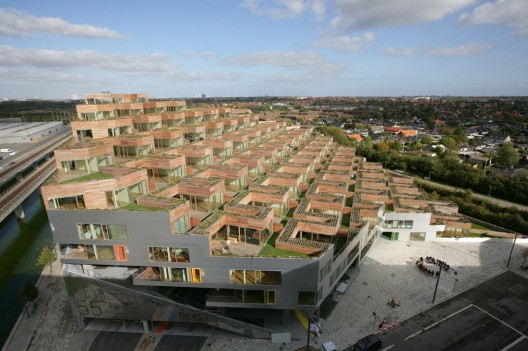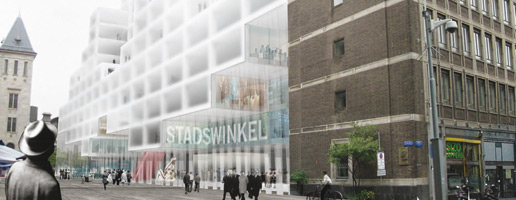I don't know, I don't see all of these falling under some notion of "pixillated". BIG's mountain is definitely not just manipulation of an otherwise flat surface; the shape IS the building. That Jean Nouvel example, on the other hand is very strictly manipulation of a surface, and I think the other ones fall somewhere in between.
What does pixillated mean, anyway? The MVRDV building reminds me more of Simmons Hall than anything else I've seen recently, and it too is a sort of "rack" that allows formal manipulation NEHIND the facade.
yeah, my mistake, this is a better example of "cube in & out" trend by big.
Sep 21, 09 11:21 am ·
·
The earliest example that I know of...
OMA, Ideal Vertical Campus, Tokyo, 2004.
"It was important for us, therefore, that the energy and life found in the typical campus was driven by the possibility of creating a different configuration for every floor. The interactivity of the typical sprawling campus is achieved through these configurations...
So are you saying the pushed-in-and-out bits are like a fig leaf applied to the naked building?
Sep 21, 09 11:52 am ·
·
In the OMA example, it was the notion of subtraction (from the typical monolithic, stacked office tower).
I'm familiar with 2D pixelization, but wonder how long 3D pixelization as been around as a form of image manipulation. It may well be the real inspiration for the OMA paradigm.
hestia17, thanks. The (reenactionary) lineage now actually makes more sense.
Although Plug-In City and Habitat share some formal aspects with the more recent "pixelated" examples, the prior emphasis on stacking cubic modules is different than the erosion of gridded, stacked slabs. The ubiquious floor-to-ceiling glass walls also add a distinction to the current genre.
Nonetheless, Plug-In City and Habitat have a place in the genealogy, and the spreading of their genes now may indeed manifest something retro.
do pixilatted voxelation buildings result in an image as you back away from them? if not then they aren't really pixallated voxelations but, more like pixey vasillations...
Sep 21, 09 2:03 pm ·
·
It doesn't seem that display resolution really plays a vital roll here, in that voxelation in architecture is more the formal result rather than the process. What is important here is the 3D play of volume elements within a corresponding 3D grid.
This project as is originates in the late 90's.
Different scale of elements, but same principle.
Sep 21, 09 3:35 pm ·
·
And what same principle is that?
At least in the final version of the Holocaust Memorial, each volume element is slightly askew and/or off-kilter from the more-2D-than-3D grid, thus not really "the 3D play of volume elements within a corresponding 3D grid."
I haven't been to the actual memorial, but I have walked through a partial full scale mock-up--80488049.
while not exactly visible, i'm certain those memorial models do indeed have the skewed blocks.
I think the similarities of the pictures speak really for themselves, as do their differences. if you'd like to constrain a definition or type in some fashion, by all means go ahead. corresponding grids or not, however you like, fine by me.
I think its quite easy to see the skewing as a separate maneuver from the blocks topographic adjustment, and the skewing in general as just another possibility put into play. put together, these things would not necessarily be legible locally.
to me, a more interesting distinction would be those blocks which are responsive to a surface or topography, as opposed to those which are a more random play on the grid, or those which respond to some other criteria, as there seem to be examples of various sorts above. equally of interest might be those which resolve back into a frame or volume and those which don't.
as to looking at disparate images and discovering similarities, differences, and perhaps even principles, I'd start with Wolfflin and Colin Rowe, perhaps Principles of Art History and Mathematics of the Ideal Villa, with the 1973 Addendum.
any hoo, g'night.
Sep 21, 09 8:54 pm ·
·
the similarities of the pictures speak really for themselves...
Voxelizarion actually does seem to be the right word to describe the formal properties of the architecture in question.
voxelizarion is the admin arch/contractors nightmare^^
Sep 21, 09 9:41 pm ·
·
aspect, that's funny!
It's interesting that the word 'voxelation' appears within the recently modified MahaNakhon wiki page, but it does not appear in any of the earlier press releases, where the word 'pixelation' is still used.
Sep 21, 09 9:59 pm ·
·
from eikongraphia, where pixel should be changed to voxel:
somehow i feel obligated to like the building especially since it comes with diagrams, but aside from the new term, it looks pretty dead...(or trying to survive)
MVRDV build a new bank headquarter!
"The structure is conceived as a steel ‘rack’ which permits adaptation to the flexible nature of the organisation." - a-hem...
Man pixelated is really the new smooth blob isn't it??
i agreed, this is what i see this week juz by browsing archinect.



herzog
big
oma
n more to come by jean nouvel

whats happen to european architects? running out of ideas?
I don't know, I don't see all of these falling under some notion of "pixillated". BIG's mountain is definitely not just manipulation of an otherwise flat surface; the shape IS the building. That Jean Nouvel example, on the other hand is very strictly manipulation of a surface, and I think the other ones fall somewhere in between.
What does pixillated mean, anyway? The MVRDV building reminds me more of Simmons Hall than anything else I've seen recently, and it too is a sort of "rack" that allows formal manipulation NEHIND the facade.
yeah, my mistake, this is a better example of "cube in & out" trend by big.

The earliest example that I know of...

OMA, Ideal Vertical Campus, Tokyo, 2004.
"It was important for us, therefore, that the energy and life found in the typical campus was driven by the possibility of creating a different configuration for every floor. The interactivity of the typical sprawling campus is achieved through these configurations...
i like the fact that our cityscape is being "pixellated" as in porn.

...or captive slaves...

^^as in censored porn.
So are you saying the pushed-in-and-out bits are like a fig leaf applied to the naked building?
In the OMA example, it was the notion of subtraction (from the typical monolithic, stacked office tower).
I'm familiar with 2D pixelization, but wonder how long 3D pixelization as been around as a form of image manipulation. It may well be the real inspiration for the OMA paradigm.
MVRDV did this in 2003! I got this from their website
http://www.mvrdv.nl/#/projects/housing/fieromilano
Plug-City, 1964
Habitat, 1967
Sprawl goes vertical...
If it's 3D, they're called voxels (technically):
http://en.wikipedia.org/wiki/Voxel
hestia17, thanks. The (reenactionary) lineage now actually makes more sense.
Although Plug-In City and Habitat share some formal aspects with the more recent "pixelated" examples, the prior emphasis on stacking cubic modules is different than the erosion of gridded, stacked slabs. The ubiquious floor-to-ceiling glass walls also add a distinction to the current genre.
Nonetheless, Plug-In City and Habitat have a place in the genealogy, and the spreading of their genes now may indeed manifest something retro.
Wow, thanks for voxel, 765! That sounds much better to me, as I think of pixellation being restricted to 2D.
765, thanks.
Has voxelation been used within the architectural lexicon before now?
do pixilatted voxelation buildings result in an image as you back away from them? if not then they aren't really pixallated voxelations but, more like pixey vasillations...

It doesn't seem that display resolution really plays a vital roll here, in that voxelation in architecture is more the formal result rather than the process. What is important here is the 3D play of volume elements within a corresponding 3D grid.
This project as is originates in the late 90's.
Different scale of elements, but same principle.
And what same principle is that?
At least in the final version of the Holocaust Memorial, each volume element is slightly askew and/or off-kilter from the more-2D-than-3D grid, thus not really "the 3D play of volume elements within a corresponding 3D grid."
I haven't been to the actual memorial, but I have walked through a partial full scale mock-up--8048 8049.
what? no mention yet of the white stripes fell in love with a girl video by michel gondry?
pix-ali-ated.
while not exactly visible, i'm certain those memorial models do indeed have the skewed blocks.
I think the similarities of the pictures speak really for themselves, as do their differences. if you'd like to constrain a definition or type in some fashion, by all means go ahead. corresponding grids or not, however you like, fine by me.
I think its quite easy to see the skewing as a separate maneuver from the blocks topographic adjustment, and the skewing in general as just another possibility put into play. put together, these things would not necessarily be legible locally.
to me, a more interesting distinction would be those blocks which are responsive to a surface or topography, as opposed to those which are a more random play on the grid, or those which respond to some other criteria, as there seem to be examples of various sorts above. equally of interest might be those which resolve back into a frame or volume and those which don't.
as to looking at disparate images and discovering similarities, differences, and perhaps even principles, I'd start with Wolfflin and Colin Rowe, perhaps Principles of Art History and Mathematics of the Ideal Villa, with the 1973 Addendum.
any hoo, g'night.
the similarities of the pictures speak really for themselves...


Voxelizarion actually does seem to be the right word to describe the formal properties of the architecture in question.
...make that voxelation.
"...it will have the unconventional appearance of a glass curtain-walled square tower with a voxelated-surface spiral cut into the side of the building."
voxelizarion is the admin arch/contractors nightmare^^
aspect, that's funny!
It's interesting that the word 'voxelation' appears within the recently modified MahaNakhon wiki page, but it does not appear in any of the earlier press releases, where the word 'pixelation' is still used.
from eikongraphia, where pixel should be changed to voxel:


Manhattan Bar Chart, by OMA
Amethyst, by OMA
2007.01.11
Michiel van Raaij:
Yes, that is right. The pixelation theme appears In this design for the Science Center…
And in the Gakuen Tower shown in the ‘Content’ Exhibition
And in the entry for the Gazprom competition
And in the Beijing Books Building
That is at least 4 times. Will the next book by Rem be called ‘Pixels’?
Actually, The New High: ODing on Voxels.*
OMA, Monaco Hotel, 2008.
Hey, everything can't be a voxel!
OMA, India Tower, 2008.
*overdosing
Voxel Populi
Voxel Gets-U-High

Philip Johnson, Lincoln Kirstein Tower, 1985.
Unhh, look like people found the Greeble modifier in 3DS.
i still like the concept of "pixelate", something that u blur it from reality
wonder why no one mention this yet^^

frankly, i hate lego when i was a kid, so unreal.
aspect, how do you see "blur it from reality" relates to any of the architecture here in question?
somehow i feel obligated to like the building especially since it comes with diagrams, but aside from the new term, it looks pretty dead...(or trying to survive)
Arch.inCriticalCondition> no i don't... i wish i do.
OMA latest voxel/pixel thing

rotterdam city offices
Block this user
Are you sure you want to block this user and hide all related comments throughout the site?
Archinect
This is your first comment on Archinect. Your comment will be visible once approved.